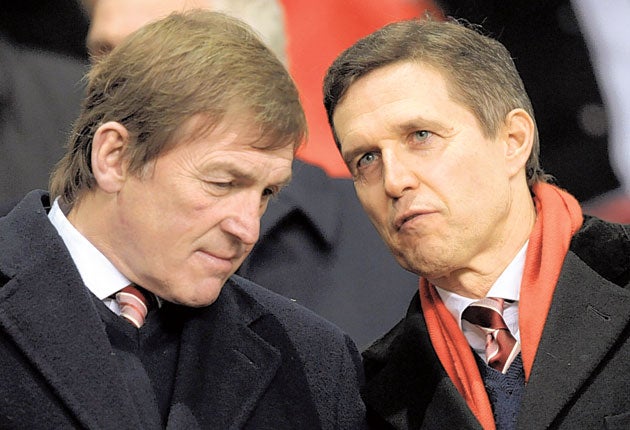Chris Brereton: Dalglish uses legendary status to buy some time for crisis-hit club
Putting 'King Kenny' in charge of finding a new manager will calm angry fans and reassure the players

Although the majority of Liverpool's fans might suggest that genius is thin on the ground at Anfield at present, the use of Kenny Dalglish, Liverpool's erstwhile manager, current academy ambassador and, frankly, legend, in the managerial recruitment process should be regarded as something of a masterstroke.
That is because he is perhaps the only member of Liverpool's current hierarchy who would have escaped unscathed had he shown his face at the fans' demonstration outside the ground on Thursday evening, following the news that Rafa Benitez and the club had parted company.
If owners Tom Hicks and George Gillett had been there, or chairman Martin Broughton or managing director Christian Purslow, then there is a fair chance that the well-behaved protesters would have been in a different frame of mind. That may be an oversimplification, but it is a symbolic way of getting across the following point, namely that Dalglish's stock is so high with Liverpool fans that he has immediately calmed and legitimised the whole procedure. If Purslow on his own was left to find Benitez's replacement, then that would be something like the beginning of the end for a large section of the club's support. But with "King Kenny" working in conjunction with Purslow at least the circus now has a respected ringmaster.
Dalglish scored 172 goals in 515 appearances for Liverpool, first as a player after joining from Celtic in 1977 before he then ascended to the role of player-manager after replacing Joe Fagan in 1985. In his first season in charge, he guided Liverpool to the League and FA Cup Double, beating Merseyside rivals Everton in the final as well as further league success in 1987-88 and 1989-90 season and another FA Cup in the 1988-89 season. He eventually resigned in February 1991, worn down by dealing with the aftermath of the Hillsborough disaster, before coming back to the club last year.
His official remit was to help develop young players as well as work with the commercial operation around the world. But it is his new position that could potentially be the most critical one he has ever held at the club.
Dalglish's appointment immediately brings an element of stability back to Liverpool and comforts their fans in the sense that it re-introduces a hint of the "Boot Room" philosophy that oversaw the club's success in the 1970s and 1980s.
One of the biggest psychological problems The Kop has had to overcome since the sale of Liverpool to Hicks and Gillett is the diminished "Scouse-ness" of the club. Although Dalglish is a proud Scot, he is one of their own. It is exactly what is required.
Do not underestimate his power as a lure either. Degrees in psychology are not required to understand the simple truth that the likes of Roy Hodgson and Martin O'Neill are likely to be much more receptive to the persuasive ways of Dalglish – a "football man" in every sense of the cliché – than they would be to Purslow or Broughton.
Dalglish won everything the domestic game can offer and will talk instinctively and passionately about the game of football to any prospective candidates.
How much better it shall be for Liverpool if the truth about the current situation is delivered from a man whose integrity and character, particularly on Merseyside, are entirely unquestioned.
King Kenny's red reign
* Kenny Dalglish has represented Liverpool as player, manager and, latterly, ambassador.
* The Scot arrived at Anfield in 1977 as a 26-year-old from Celtic, for a British record £440,000. He scored 118 goals in 355 games, including the winner in the 1978 European Cup final, one of three European titles he won with the club.
* He also won six league titles and the FA Cup before becoming player-manager in 1985. Three more titles and two FA Cups followed before his retirement in 1990. Rafael Benitez brought him back to Anfield in an ambassadorial role last July.
Subscribe to Independent Premium to bookmark this article
Want to bookmark your favourite articles and stories to read or reference later? Start your Independent Premium subscription today.

Join our commenting forum
Join thought-provoking conversations, follow other Independent readers and see their replies